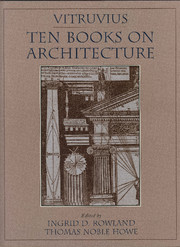Book contents
- Frontmatter
- Dedication
- Contents
- Acknowledgments
- List of Illustrations
- Translator's Preface
- Illustrator's Preface
- VITRUVIUS
- INTRODUCTION
- LIST OF MANUSCRIPTS SEEN
- THE TRANSLATION
- Book 1 First Principles and the Layout of Cities
- Book 2 Building Materials
- Book 3 Temples
- Book 4 Corinthian, Doric, and Tuscan Temples
- Book 5 Public Buildings
- Book 6 Private Buildings
- Book 7 Finishing
- Book 8 Water
- Book 9 Sundials and Clocks
- Book 10 Machines
- COMMENTARY
- Index
Book 5 - Public Buildings
Published online by Cambridge University Press: 18 December 2014
- Frontmatter
- Dedication
- Contents
- Acknowledgments
- List of Illustrations
- Translator's Preface
- Illustrator's Preface
- VITRUVIUS
- INTRODUCTION
- LIST OF MANUSCRIPTS SEEN
- THE TRANSLATION
- Book 1 First Principles and the Layout of Cities
- Book 2 Building Materials
- Book 3 Temples
- Book 4 Corinthian, Doric, and Tuscan Temples
- Book 5 Public Buildings
- Book 6 Private Buildings
- Book 7 Finishing
- Book 8 Water
- Book 9 Sundials and Clocks
- Book 10 Machines
- COMMENTARY
- Index
Summary
PREFACE
1. Those, Imperator, who have set out their own thoughts and their researches in volumes more lofty than these in style, have contributed the greatest and most outstanding authority to their writings. So, too, with our own enterprise, the subject will obviously prove to be one whose authority would be enhanced by more elevated presentation, but this is not so easy to do as people think. Architectural writing is not like the writing of history or of poetry. Histories by their very nature maintain the interest of their readers; they present the ever-changing anticipation of learning something new. With poems,* on the other hand, it is the meters, the feet, and the elegant placement of words, as well as the varieties of expression adopted by various readers as they take their turns in reading aloud,* that carry our interest along to the end of the composition without a misstep. 2. This is not possible for architectural writing because the terms that have been devised to meet the needs of this art inflict the obscurity of their unfamiliar language on our senses. To begin with, then, these words are neither obvious in themselves nor are their names clear from common use. Furthermore, unless the wide-ranging writings of authorities on this subject have been condensed and expressed in a few, crystal-clear sentences, the density of the prose, not to mention the sheer length of it, confuses readers' minds.
Therefore, as I employ these esoteric names and the proportions derived from the components of architectural projects, I shall explain them briefly so that they may be memorized. In this way, readers' minds shall be able to absorb the information more quickly. 3. And no less emphatically, because I have observed that the city is thronged with people wholly engrossed in their business, public and private,* I have decided that it is better to write concisely, so that people reading in their restricted leisure time may understand these points quickly.
- Type
- Chapter
- Information
- Vitruvius: 'Ten Books on Architecture' , pp. 63 - 74Publisher: Cambridge University PressPrint publication year: 1999



